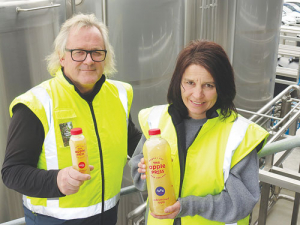Ross Beaton and Sally Gallagher have a simple and compelling business objective: making apple juice great again, or as they say, making the apple the hero.
Their company The Apple Press in Hawke’s Bay takes what many see as the by-product of the apple industry – apples not good-looking enough to export or sell but otherwise perfectly good – and turning these into a high-quality juice.
Ross Beaton has always worked in the pip fruit industry, successfully owning and running orchards. But like many entrepreneurs he wanted to try something different. He saw most apples not sold as fruit being bundled together for juice concentrate for a base for other juices.
He saw a need for a paradigm shift – a new way of thinking.
“To me it seemed crazy to be spending a lot of money growing apples, yet thousands of tonnes were being virtually wasted by turning them into low grade apple juice,” he told Hort News.
“So I started this project asking ‘how could we turn that volume of high-quality product into something in a different form and sell it globally?’ I had a couple of ideas, and went around looking at this and that, and during my travels I went to the food industry network in Auckland and asked if they could help me.”
They answered ‘yes’ and put him in touch with food technologist Sally Gallagher in Napier and together they looked into the project. A key parameter was to go all out on the project, not just tinker with it.
“We wanted to use technology, use scale and go global using the smartest technology and the world’s best ingredients to develop the markets where we had sold apples in the past,” Beaton says.
Sally Gallagher looked at the product options, e.g. baby food, service powders, extracts, but they finally decided a beverage was the best option. Then came finding technology to match their objectives.
“There is a lot of cool technology you can use but it doesn’t give you shelf life, so we decided we needed to achieve a fresh tasting product with an extended chilled shelf life and that’s the technology we brought in here to Hawke’s Bay.”
Their technology allows the juice to be packed in a sterile environment -- the key to extending the life of the product. It also requires no preservatives to get the extended chilled shelf-life and no sugar is added. “Normally chilled juice has a shelf life of about 60 days. We get nine months.”
Gallagher says the value proposition is clean, traceable product. They source tonnes of apples locally and these are traceable back to the exact orchard they came from.
Taking on the world!
Before committing to the venture, Beaton and Gallagher did a lot of market research in the US and China that helped them in positioning and promoting the product.
They found that in the US the country of origin was not a major factor, whereas in China – which has had many food scares – it was.
“Overall, they wanted it to be from a trusted and reliable source, as natural as possible with no preservatives, and they didn’t want a long ingredients declaration; rather they want a short list and they want it to be from very high-quality raw materials,” Gallagher explains.
“The quality raw material piece sounds trite, but it is the key to our whole success. The rationale is that we take the apple from the tree and look after it all the way to when we press and bottle it, then all the way to the market.”
Beaton says for a long time apple juice has been a low-quality product consisting of concentrated apple juice with tap water added. He and Gallagher have moved away from this to focus instead on an apple juice beverage from a single apple variety such as JAZZ, Braeburn and Royal Gala.
“It’s making the apple the hero. Scientists have developed great apple varieties we are doing out bit to showcase the quality of NZ apples,” he says.
The new juices are selling in supermarkets NZ-wide and they are seeking export markets.
They acknowledge not everyone likes pure apple juice, so they offer blends such as apple and pear and apple and feijoa. But again the emphasis is on high-quality juice.
While their core target market is the 20 - 40 age group, they say people of all ages seem drawn to their product.
They’ve had their challenges: getting investors on board was no easy task but they have persevered and their dream is coming true by the day.
“At The Apple Press we are making a world-class product and we want to share that with the world,” Beaton says.



















